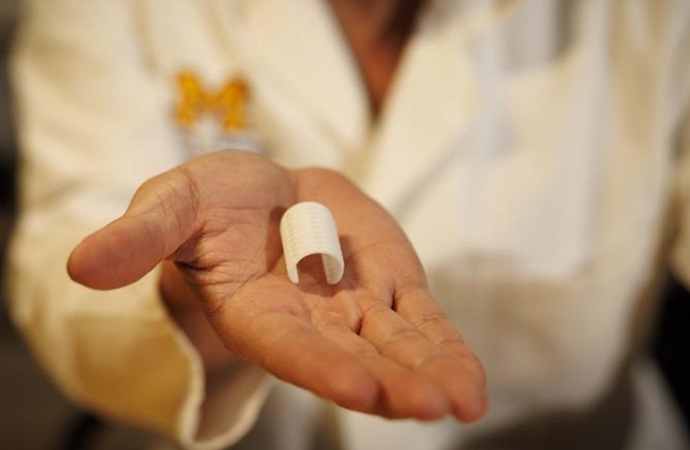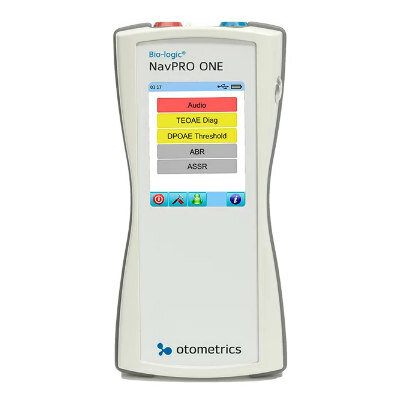First-Of-Its-Kind Bioresorbable Implant to Help Children with Rare Respiratory Disease
|
By HospiMedica International staff writers Posted on 07 Mar 2025 |

Tracheobronchomalacia is a rare, life-threatening condition in which the cartilage in the trachea or mainstem bronchi develops abnormally, causing the airway to collapse and making breathing difficult for children. The severity of the condition can vary and it can also be fatal in some cases. Infants with tracheobronchomalacia often rely on ventilators to survive. While most children with this condition experience mild symptoms that resolve by age three, once the tracheal cartilage strengthens, there has been a lack of treatment options for those with the most severe forms of the disease. A new clinical trial is now underway to explore the use of 3D-printed bioresorbable devices to treat children with tracheobronchomalacia.
The trial, launched by Michigan Medicine (Ann Arbor, MI, USA) and Materialise (Leuven, Belgium), represents a significant step toward full Food and Drug Administration (FDA) approval for these innovative devices designed to support the airways of infants with the most severe cases of the condition. The research began more than ten years ago, focusing on the development of a biodegradable scaffold that could be tailored to each patient, manufactured as a tracheal splint. The device is placed on the outer side of the trachea or mainstem bronchi to help keep the airway open and prevent collapse. It was the first 3D implant designed for children, intended to grow with the patient and be safely absorbed into the body over time. In 2012, the tracheal splint was used for the first time to save the life of a three-month-old with a severe case of tracheobronchomalacia, with the successful outcome published in the New England Journal of Medicine. Through collaboration with the FDA, Institutional Review Board, and hospital administration, the researchers were granted emergency approval to use the bioresorbable scaffolding. For over a decade, the researchers have been able to obtain expanded access approval from the FDA on a case-by-case basis to use a pioneering 3D-printed bioresorbable airway splint for these children under emergency or compassionate use circumstances. The device has been used in over 40 children at Mott but this groundbreaking treatment has only been available to a limited number of patients.
With FDA approval now in place for the 3D-printed bioresorbable devices to be tested in a clinical trial, this marks a crucial step toward achieving full FDA approval for treating children with this life-threatening condition. With the clinical trial now underway, researchers at Michigan Medicine and Materialise are working to enable broader access to the device by evaluating its safety and efficacy. The trial, which opened in January, is currently enrolling its first patients. The study aims to enroll 35 infants over the next eight years from U-M Health C.S. Mott Children’s Hospital and four other children’s hospitals across the United States, with the devices being produced by Materialise. Throughout the trial, the devices will be manufactured by Materialise, a leader in pioneering medical 3D printing applications.
“We have established a process that allows us to offer the customized airway splint as a last resort treatment for certain children with no other options but we need more research to make it available on a wider scale,” said trial principal investigator Richard Ohye, M.D., a pediatric heart surgeon at Mott, who leads surgical implantation of the device.
“The advent of technologies such as 3D printing and advanced visualization techniques has transformed patient-specific care,” added Colleen Wivell, Director of Clinical Engineering at Materialise. “Surgeons increasingly adopt 3D printing as part of their surgical workflow to bring personalized care to patients, improving healthcare and reducing costs overall. We’re so pleased to support this life-saving treatment and look forward to continuing to impact these children and their families.”
Related Links:
Michigan Medicine
Materialise
Latest Critical Care News
- AI-Powered, Internet-Connected Medical Devices to Revolutionize Healthcare, Finds Study
- Starfish-Inspired Wearable Tech Enables Smarter Heart Monitoring
- AI Eye Scans Could Help Identify Heart Disease and Stroke Risk
- Digital Heart Twin Improves Diagnosis and Treatment of Cardiac Arrhythmias
- First-Of-Its-Kind AI-Powered Probability Scoring System Assesses Heart Failure with Preserved Ejection Fraction
- AI-Assisted Colonoscopy Detects More Polyps but Has Modest Effect on Cancer Risk
- Wearables Could Reduce Need for Continuous Blood Thinners in Patients with Atrial Fibrillation
- AI Model Provides Real-Time Sepsis Risk Alerts for Improving ICU Patient Survival
- AI Algorithm Improves Intravenous Nutrition for Premature Babies
- Smart Mirror Generates AI-Powered Health Insights by Analyzing Facial Blood Flow
- Painless Diabetes Patch to Replace Needle Pricks

- Sensory T-Shirt Monitors Patient’s Vitals After Urological Surgery for Cancer
- Super-Sensitive Radar Technology Warns of Serious Heart Issues
- Thermal Imaging Could Accurately Track Vital Signs for Early Disease Detection
- New Microfluidic Device Improves Safety of Leukemia Treatment for Children
- Precision Transfusion Approach Improves Outcomes in TBI Patients
Channels
Critical Care
view channel
AI-Powered, Internet-Connected Medical Devices to Revolutionize Healthcare, Finds Study
A new study suggests that artificial intelligence (AI)-powered, internet-connected medical devices have the potential to transform healthcare by enabling earlier detection of diseases, real-time patient... Read more
Starfish-Inspired Wearable Tech Enables Smarter Heart Monitoring
Physical movement can make it challenging for current wearable devices to accurately track heart activity. Now, a starfish’s five-arm shape has helped resolve this issue. Inspired by the starfish's ability... Read morePatient Care
view channel
Portable Biosensor Platform to Reduce Hospital-Acquired Infections
Approximately 4 million patients in the European Union acquire healthcare-associated infections (HAIs) or nosocomial infections each year, with around 37,000 deaths directly resulting from these infections,... Read moreFirst-Of-Its-Kind Portable Germicidal Light Technology Disinfects High-Touch Clinical Surfaces in Seconds
Reducing healthcare-acquired infections (HAIs) remains a pressing issue within global healthcare systems. In the United States alone, 1.7 million patients contract HAIs annually, leading to approximately... Read more
Surgical Capacity Optimization Solution Helps Hospitals Boost OR Utilization
An innovative solution has the capability to transform surgical capacity utilization by targeting the root cause of surgical block time inefficiencies. Fujitsu Limited’s (Tokyo, Japan) Surgical Capacity... Read more
Game-Changing Innovation in Surgical Instrument Sterilization Significantly Improves OR Throughput
A groundbreaking innovation enables hospitals to significantly improve instrument processing time and throughput in operating rooms (ORs) and sterile processing departments. Turbett Surgical, Inc.... Read moreHealth IT
view channel
Printable Molecule-Selective Nanoparticles Enable Mass Production of Wearable Biosensors
The future of medicine is likely to focus on the personalization of healthcare—understanding exactly what an individual requires and delivering the appropriate combination of nutrients, metabolites, and... Read more
Smartwatches Could Detect Congestive Heart Failure
Diagnosing congestive heart failure (CHF) typically requires expensive and time-consuming imaging techniques like echocardiography, also known as cardiac ultrasound. Previously, detecting CHF by analyzing... Read morePoint of Care
view channel
Handheld, Sound-Based Diagnostic System Delivers Bedside Blood Test Results in An Hour
Patients who go to a doctor for a blood test often have to contend with a needle and syringe, followed by a long wait—sometimes hours or even days—for lab results. Scientists have been working hard to... Read more
Smartphone-Enabled, Paper-Based Quantitative Diagnostic Platform Transforms POC Testing
Point-of-care diagnostics are crucial for public health, offering rapid, on-site testing that enables prompt diagnosis and treatment. This is especially valuable in remote or underserved regions where... Read moreBusiness
view channel
Expanded Collaboration to Transform OR Technology Through AI and Automation
The expansion of an existing collaboration between three leading companies aims to develop artificial intelligence (AI)-driven solutions for smart operating rooms with sophisticated monitoring and automation.... Read more


















